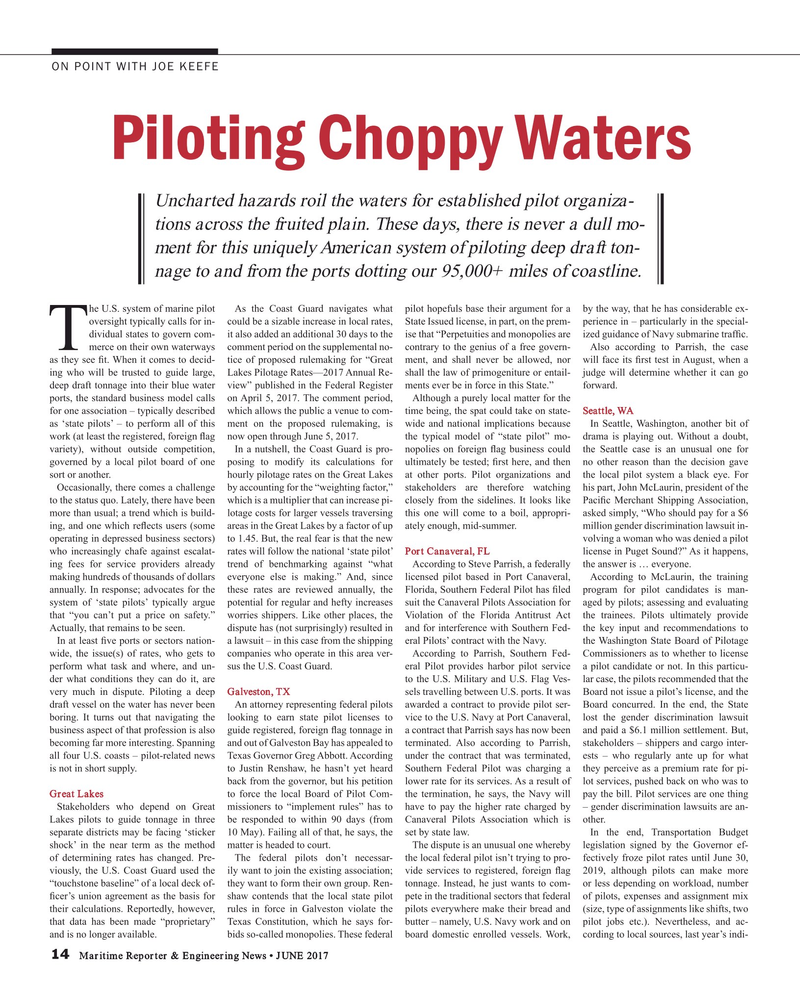
Page 14: of Maritime Reporter Magazine (June 2017)
U.S. Navy Quarterly
Read this page in Pdf, Flash or Html5 edition of June 2017 Maritime Reporter Magazine
ON POINT WITH JOE KEEFE
Piloting Choppy Waters
Uncharted hazards roil the waters for established pilot organiza- tions across the fruited plain. These days, there is never a dull mo- ment for this uniquely American system of piloting deep draft ton- nage to and from the ports dotting our 95,000+ miles of coastline.
he U.S. system of marine pilot As the Coast Guard navigates what pilot hopefuls base their argument for a by the way, that he has considerable ex- oversight typically calls for in- could be a sizable increase in local rates, State Issued license, in part, on the prem- perience in – particularly in the special- dividual states to govern com- it also added an additional 30 days to the ise that “Perpetuities and monopolies are ized guidance of Navy submarine traf? c.
Tmerce on their own waterways comment period on the supplemental no- contrary to the genius of a free govern- Also according to Parrish, the case as they see ? t. When it comes to decid- tice of proposed rulemaking for “Great ment, and shall never be allowed, nor will face its ? rst test in August, when a ing who will be trusted to guide large, Lakes Pilotage Rates—2017 Annual Re- shall the law of primogeniture or entail- judge will determine whether it can go deep draft tonnage into their blue water view” published in the Federal Register ments ever be in force in this State.” forward.
ports, the standard business model calls on April 5, 2017. The comment period, Although a purely local matter for the for one association – typically described which allows the public a venue to com- time being, the spat could take on state- Seattle, WA as ‘state pilots’ – to perform all of this ment on the proposed rulemaking, is wide and national implications because In Seattle, Washington, another bit of work (at least the registered, foreign ? ag now open through June 5, 2017. the typical model of “state pilot” mo- drama is playing out. Without a doubt, variety), without outside competition, In a nutshell, the Coast Guard is pro- nopolies on foreign ? ag business could the Seattle case is an unusual one for governed by a local pilot board of one posing to modify its calculations for ultimately be tested; ? rst here, and then no other reason than the decision gave sort or another. hourly pilotage rates on the Great Lakes at other ports. Pilot organizations and the local pilot system a black eye. For
Occasionally, there comes a challenge by accounting for the “weighting factor,” stakeholders are therefore watching his part, John McLaurin, president of the to the status quo. Lately, there have been which is a multiplier that can increase pi- closely from the sidelines. It looks like Paci? c Merchant Shipping Association, more than usual; a trend which is build- lotage costs for larger vessels traversing this one will come to a boil, appropri- asked simply, “Who should pay for a $6 ing, and one which re? ects users (some areas in the Great Lakes by a factor of up ately enough, mid-summer. million gender discrimination lawsuit in- operating in depressed business sectors) to 1.45. But, the real fear is that the new volving a woman who was denied a pilot who increasingly chafe against escalat- rates will follow the national ‘state pilot’ Port Canaveral, FL license in Puget Sound?” As it happens, ing fees for service providers already trend of benchmarking against “what According to Steve Parrish, a federally the answer is … everyone.
making hundreds of thousands of dollars everyone else is making.” And, since licensed pilot based in Port Canaveral, According to McLaurin, the training annually. In response; advocates for the these rates are reviewed annually, the Florida, Southern Federal Pilot has ? led program for pilot candidates is man- system of ‘state pilots’ typically argue potential for regular and hefty increases suit the Canaveral Pilots Association for aged by pilots; assessing and evaluating that “you can’t put a price on safety.” worries shippers. Like other places, the Violation of the Florida Antitrust Act the trainees. Pilots ultimately provide
Actually, that remains to be seen. dispute has (not surprisingly) resulted in and for interference with Southern Fed- the key input and recommendations to
In at least ? ve ports or sectors nation- a lawsuit – in this case from the shipping eral Pilots’ contract with the Navy. the Washington State Board of Pilotage wide, the issue(s) of rates, who gets to companies who operate in this area ver- According to Parrish, Southern Fed- Commissioners as to whether to license perform what task and where, and un- sus the U.S. Coast Guard. eral Pilot provides harbor pilot service a pilot candidate or not. In this particu- der what conditions they can do it, are to the U.S. Military and U.S. Flag Ves- lar case, the pilots recommended that the very much in dispute. Piloting a deep Galveston, TX sels travelling between U.S. ports. It was Board not issue a pilot’s license, and the draft vessel on the water has never been An attorney representing federal pilots awarded a contract to provide pilot ser- Board concurred. In the end, the State boring. It turns out that navigating the looking to earn state pilot licenses to vice to the U.S. Navy at Port Canaveral, lost the gender discrimination lawsuit business aspect of that profession is also guide registered, foreign ? ag tonnage in a contract that Parrish says has now been and paid a $6.1 million settlement. But, becoming far more interesting. Spanning and out of Galveston Bay has appealed to terminated. Also according to Parrish, stakeholders – shippers and cargo inter- all four U.S. coasts – pilot-related news Texas Governor Greg Abbott. According under the contract that was terminated, ests – who regularly ante up for what is not in short supply. to Justin Renshaw, he hasn’t yet heard Southern Federal Pilot was charging a they perceive as a premium rate for pi- back from the governor, but his petition lower rate for its services. As a result of lot services, pushed back on who was to
Great Lakes to force the local Board of Pilot Com- the termination, he says, the Navy will pay the bill. Pilot services are one thing
Stakeholders who depend on Great missioners to “implement rules” has to have to pay the higher rate charged by – gender discrimination lawsuits are an-
Lakes pilots to guide tonnage in three be responded to within 90 days (from Canaveral Pilots Association which is other.
separate districts may be facing ‘sticker 10 May). Failing all of that, he says, the set by state law. In the end, Transportation Budget shock’ in the near term as the method matter is headed to court. The dispute is an unusual one whereby legislation signed by the Governor ef- of determining rates has changed. Pre- The federal pilots don’t necessar- the local federal pilot isn’t trying to pro- fectively froze pilot rates until June 30, viously, the U.S. Coast Guard used the ily want to join the existing association; vide services to registered, foreign ? ag 2019, although pilots can make more “touchstone baseline” of a local deck of- they want to form their own group. Ren- tonnage. Instead, he just wants to com- or less depending on workload, number ? cer’s union agreement as the basis for shaw contends that the local state pilot pete in the traditional sectors that federal of pilots, expenses and assignment mix their calculations. Reportedly, however, rules in force in Galveston violate the pilots everywhere make their bread and (size, type of assignments like shifts, two that data has been made “proprietary” Texas Constitution, which he says for- butter – namely, U.S. Navy work and on pilot jobs etc.). Nevertheless, and ac- and is no longer available. bids so-called monopolies. These federal board domestic enrolled vessels. Work, cording to local sources, last year’s indi- 14 Maritime Reporter & Engineering News • JUNE 2017
MR #6 (10-17).indd 14 MR #6 (10-17).indd 14 6/7/2017 11:00:04 AM6/7/2017 11:00:04 AM

 13
13

 15
15
